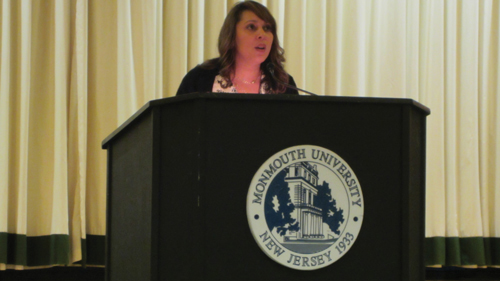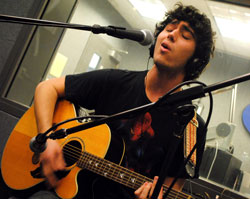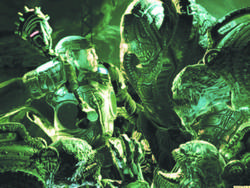African-American poet Natasha Trethewey visited Wilson Hall Auditorium last Thursday to read poems from her upcoming release titled “Thrall.” The event was presented by the University’s Center for the Arts Visiting Writer’s Series.
Trethewey, born in Mississippi, is a renowned writer with three collections of poetry released including “Native Guard,” which earned her the 2007 Pulitzer Prize in poetry. She is also the author of a creative non-fiction book titled “Katrina: A Meditation on the Mississippi Gulf Coast.”
Trethewey has been the recipient of many awards and honors and was inducted into the Georgia Writers Hall of Fame.
The event was attended by many including undergraduate and graduate students, professors and fans of Trethewey.
Hannah Portnoy, an adjunct for the English department, who was attending the event with her class, said the students “really wanted to come” to this event and she thought it be great for them as well. “I just love poetry and literature. We’re in the English department and I think that it’s good to have [students] exposed to it,” said Portnoy. “It’s very important for the students to gain experience in listening; it adds another dimension. And it’s always wonderful to meet and hear the poet.”
Michael Thomas, Director of the Visiting Writer’s Series, started the reading with a great introduction, saying, “Without music, without art, without poetry, literature, we don’t survive, we don’t prosper. Also, we need you, our audience, scholars and listeners. We need your attention because without all of you, one might say the poems don’t have life, they don’t breathe.”
Thomas, who is also Assistant Dean of the School of Humanities and Social Sciences, said Trethewey had visited the University before in 2006 as a featured poet for the Long Branch Poetry Festival, “right here in this very room.”
“Several months later,” Thomas continued, “she won the Pulitzer Prize. I hope that this means Monmouth University delivers more good fortune to her in the next year. My guess is that there are other awards on the horizon.”
Trethewey was very grateful when she came to the podium, giving thanks to Thomas for his “lovely introduction.” She began explaining where the title from her forthcoming book “Thrall” came from. Trethewey said while working on her previous collection “Native Guard,” she looked up the meaning of native in the Oxford English Dictionary. Contrary to what she thought she would find, the definition read someone born into the condition of servitude, enthrall.
“I’ve been thinking about the way that we are enthralled to things, particularly to language, especially language that seeks to shape us and our identities and thus our experience,” Trethewey said. “The book is in many ways about, on a personal level, my father, but it’s also about knowledge, the language of empire and the roots of deeply ingrained and unexamined notions of white supremacy.”
Trethewey started with a poem titled “Illumination,” where she pondered how history is recorded and influenced by its writer and effect on its reader. She read in a calm somber voice, saying “… there are questions, the word why. So much is left untold, between the printed word and the self-conscious scroll, between what is said and what is not.”
Trethewey offered thoughts and interpretations of history and art, like “The Miracle of the Black Leg,” the story of Saints Cosmas and Damian replacing a man’s ulcerated leg with a leg from a black Ethiopian, depending on the version, inspiring different historical paintings.
The poem was divided into three sections, as the first section ended with, “Even now it stays with us, when we mean to uncover the truth, we dig, say, unearth,” while the second says “For centuries, this is how the myth repeats. The miracle in words, wood or paint is a record of thought.”
Joe Dugan of Philadelphia came to the event after an invitation from his sister who had met Trethewey before and thought the event was wonderful.
“I think the series writing to her father really touched my soul, it was awesome,” said Dugan. “I’ve taught art and painting, and the way she talked about paintings and about portraitures was very touching to me, was very interesting. I loved the way she weaved history and the aesthetics she talked about. I just really enjoyed the way she rendered the artwork.”
Trethewey’s poetry is rich with history and culture, but also filled with personal experiences that help the audience understand Trethewey’s roots and poetic soul. Like the poem “The Americans,” a look into comparative anatomy between blacks and whites, the title taken from a series of photographs by Robert Frank. The poem is divided into three sections as well, dealing heavily with the artistic interpretation of this dissection, “she looks out towards us as if to bridge the distance between.”
But the third part that stems from seeing Frank’s photograph inspires Trethewey to write about being raised by her African American mother, “How like the woman in the photograph, she must have seemed carrying me each day, white in her arms, as if she were a prop, a black backdrop, the dark foil in this American story.”
After she left the audience speechless, Trethewey made them laugh when she said, “I always forget to mention I was white when I was born.”
Christine Bryant and Mariana Sierra, graduate students in the creative writing program, both enjoyed the event. They were very inspired and influenced in how to approach and write their poetry.
Sierra said she was motivated by Trethewey as Sierra is Hispanic. “So, I know what it is to be mixed blood, and a lot of it was really relevant and pertinent to me.”
PHOTO COURTESY of Dan Ste. MarieAfrican-American poet




